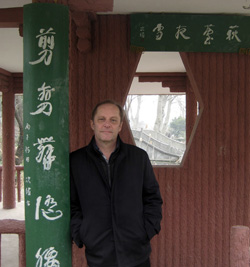By Matt Cutugno
Nanjing, China
The Wild East
I had a dream last night that my wife and I were crossing a busy highway on foot. Traffic was heavy and coming in both directions. We managed to make it to the middle of the thoroughfare, where we stopped. I held on tightly to Lily as I turned my head in one direction then another. A truck blew by us, then a car blared its horn as it passed. There was not the slightest letdown in traffic and even though I waved and pleaded at oncoming cars, none of the vehicles would slow down to let us continue across. It was disconcerting - what’s wrong with these people? Then I realized: I was in China.

Matt Cutugno - Nanjing
|
One of the glaring differences between the East and the West is in the role of the pedestrian (xíng rén). If the general rule (and law) in America is that pedestrians have the right of way, the rule in China is “get out of the way now.” Even in tough New York, I cross the streets, even jaywalk, assured that drivers are at least cognizant of my existence. Here in the Middle Kingdom, it’s a different story.
In downtown Nanjing, I watch little old ladies who have started across the street hurry back to the curb against the threat of an oncoming conveyance. Riders on their scooters or motorcycles will cut off a mother and child as they stroll. It strikes me as odd, given the Chinese culture’s traditional respect for family, and especially the elderly.
What can explain this primacy of wheels over feet? The Chinese are naturally an industrious people, so perhaps the feeling is “I’m driving, I have things to do, while you are obviously in no hurry because you’re walking, so I go first!”
I’ve noticed two strange dynamics among drivers. If I’m in a car and my vehicle allows, say, three feet of space to the car in front, some other motorist will consider that an invitation to drive into that space in an attempt to get ahead in traffic.
If vehicular traffic is light and the street is full of xíng rén and bike riders, then an approaching car simply honks its horn continuously and everyone scampers aside as the car barrels forward.
My concern over such behavior is not simply about inconsiderateness. I have personally witnessed a number of accidents in China that I would call serious or even scary. And much more common is witnessing a crumpled bicycle or fallen motorcyclist - testimony to traffic mayhem.
A final irony though is that road rage doesn’t seem to exist. When a lady walking is cut off or a young man is forced to the curb, there is no visible reaction against the driver. When one car cuts in front of another, I have yet to see much acrimony.
Apparently the Chinese do not resent this behavior as much as I do witnessing it.
Fat of the Land
America is called Mei Guo in Mandarin, that is, the beautiful country. It seems our blessings are a source of envy not just to the Chinese, but to much of the world.

Matt Cutugno at the Nanjing city wall
|
When I am in China, however, I’m jealous in one significant regard - their eating habits and physical fitness. When it comes to that, we have a lot to learn.
Simply put, the Chinese eat and live healthy. Meat is used in many dishes, but it is invariably cut into small pieces and combined with larger amounts of vegetables or noodles or tofu. On the other hand, Americans have been known to regularly consume a piece of meat the size of a waffle.
In China, soup is served at practically every meal, even at breakfast in the form of xi fan, a kind of porridge. It can be made of red beans and sesame with rice. Warm and nutritious, it’s a perfect start to the day. Also served are bao zi, delicate dumplings filled with vegetables (and noticeably without a pat of butter on top). I really enjoy yu tiao, a thin stick of fried dough that’s good for dunking into xi fan.
The Chinese will liquefy just about anything, all to good effect. Since I’ve been here in Nanjing, I’ve had delicious drinks made of pumpkin, corn, lotus root, banana and soy. I have not had chocolate, potato chips, hamburgers, or even cheese. And I have not missed them.
When you add to this the fact that every morning, in practically every park in Chinese cities, folks are gathered for exercise (yun dòng) - be it in the form of tai chi or aerobics or ballroom dancing. Then consider that these folks likely have ridden their bicycles to the park and will ride them home. It’s easy to see what is always obvious to me upon arriving in China - there are few overweight people.
Meanwhile, back in Mei Guo, that beautiful land, our society struggles with health care reform. Our politicians are stumped and the under-insured are angry. I have a novel idea for Americans: Eat less and exercise more. Wouldn’t it be nice if while reforming our health care industry, we also reformed our attitude and concentrated on creating a culture of health and well-being? It would be a culture that we need not preach about or bother to legislate. We would simply practice it.
Like the Chinese have done.
Matt Cutugno is the author of The Winter Barbeque.

